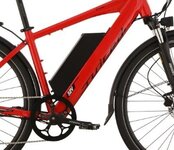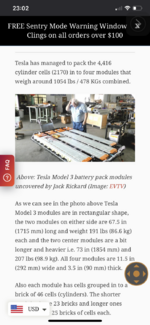Ravi Kempaiah
Well-Known Member
- Region
- Canada
- City
- Halifax
Batteries constitute a significant portion of the purchase price and replacement costs can be quite high.
Lack of standardization and innovation has left this space needing some much-needed attention.
Except for Yamaha and a few packs from BMZ, most batteries are warrantied for 2 or less than 2 years.
Even a Hailong case standard battery (48V, 14Ah) from Rad costs about $610 including shipping and they carry 1yr warranty.
To put in context, that's about $910 / kWhr
Premium brands like Yamaha, Bosch, the cost can go up to $1400 to $1600 / kWhr
To really make the EV revolution happen on a wider scale, batteries that are built to very high standards but cost 30 to 40% less of these aforementioned numbers are needed. The number one reason most people are skeptical about electrical cars is that the battery replacement cost can be prohibitive. This is despite the fact that most car makers offer a very generous 8 years/ 100,000 miles warranty on their hybrid + battery systems. This equates to around $350- $400/ kWhr. Even then most people are skeptical about an electric car purchase.
But, E-bike riders are willing to pay $900/ kWhr for just 1 year warranty. Most E-bike riders tend to turn a blind eye to high battery pack prices because E-bikes are so wonderful and offer so many benefits.
As the market is taking off, people will start realizing this hurdle within 2-3 years of ownership.
So, I would like to ask the community:
Feel free to check the replacement cost of your battery pack for better clarity.
The following infographic describes the situation in the EV market where the batteries have robust liquid cooling. But, the prices quoted in the picture may not include module assembly, BMS, liquid cooling, overheads. So, adding all that, a very conservative number would be $200-$250/ kWhr for 8yrs to 10 yrs warranty.

Lack of standardization and innovation has left this space needing some much-needed attention.
Except for Yamaha and a few packs from BMZ, most batteries are warrantied for 2 or less than 2 years.
Even a Hailong case standard battery (48V, 14Ah) from Rad costs about $610 including shipping and they carry 1yr warranty.
To put in context, that's about $910 / kWhr
Premium brands like Yamaha, Bosch, the cost can go up to $1400 to $1600 / kWhr
To really make the EV revolution happen on a wider scale, batteries that are built to very high standards but cost 30 to 40% less of these aforementioned numbers are needed. The number one reason most people are skeptical about electrical cars is that the battery replacement cost can be prohibitive. This is despite the fact that most car makers offer a very generous 8 years/ 100,000 miles warranty on their hybrid + battery systems. This equates to around $350- $400/ kWhr. Even then most people are skeptical about an electric car purchase.
But, E-bike riders are willing to pay $900/ kWhr for just 1 year warranty. Most E-bike riders tend to turn a blind eye to high battery pack prices because E-bikes are so wonderful and offer so many benefits.
As the market is taking off, people will start realizing this hurdle within 2-3 years of ownership.
So, I would like to ask the community:
- How much are you willing to pay for a standard battery, let's say 48V, 14Ah that is guaranteed to last at least 50,000 miles and carries a legal, written 5-year warranty ?
Sometimes companies go belly up within those 5 years but if there is a strong support system in place and a written legal document certifying that it will be guaranteed for 5 years under normal usage (not abuse) conditions, what would you pay for such a battery?
[The weight of the battery is a concern but given the small pack capacities, a significant increase in the energy density is not possible at least until 2025. So, weight is not taken into consideration in asking the above question.]
- If your battery had a deep sleep mode for winter storage, would you be willing to pay a premium for that?
Feel free to check the replacement cost of your battery pack for better clarity.
The following infographic describes the situation in the EV market where the batteries have robust liquid cooling. But, the prices quoted in the picture may not include module assembly, BMS, liquid cooling, overheads. So, adding all that, a very conservative number would be $200-$250/ kWhr for 8yrs to 10 yrs warranty.
Last edited:

/cloudfront-us-east-2.images.arcpublishing.com/reuters/O4UCQDBX2RJFZFKN2WLAPTUFXU.jpg)


